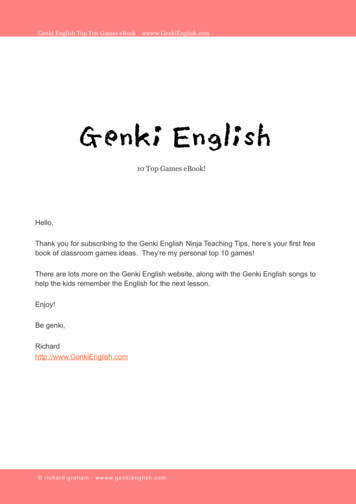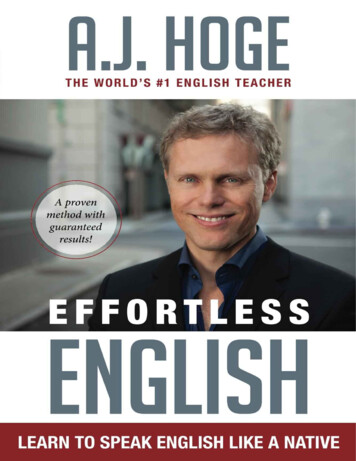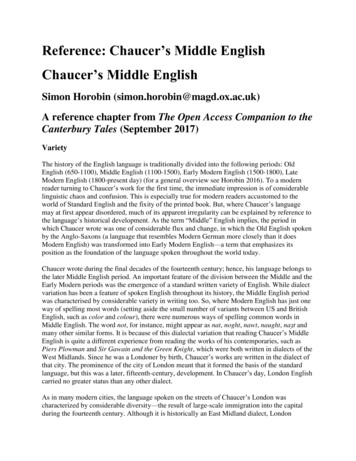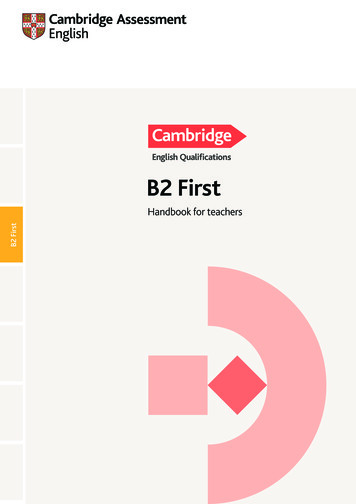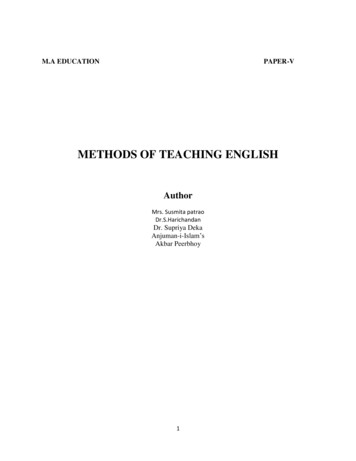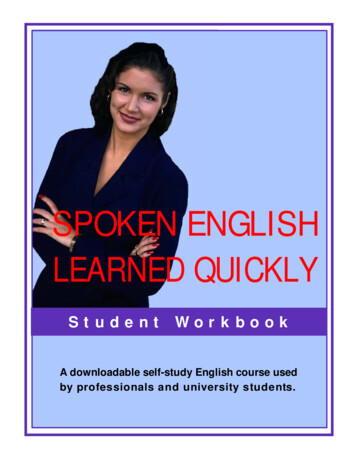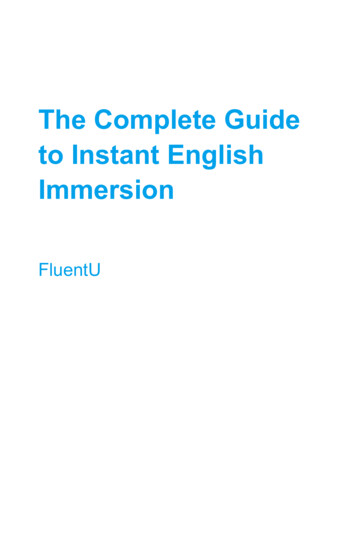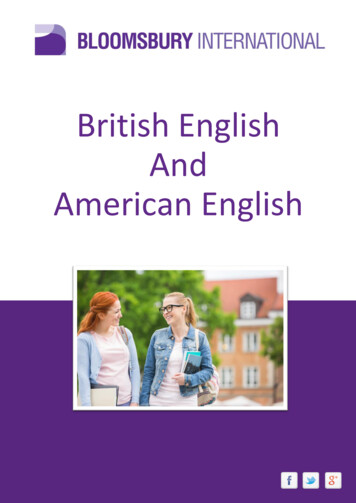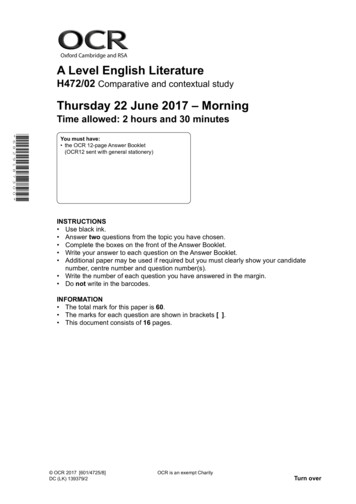
Transcription
Oxford Cambridge and RSAA Level English LiteratureH472/02 Comparative and contextual studyThursday 22 June 2017 – MorningTime allowed: 2 hours and 30 minutes* 6 8 2 9 1 8 7 3 0 0 *You must have: the OCR 12-page Answer Booklet(OCR12 sent with general stationery)INSTRUCTIONS Use black ink. Answer two questions from the topic you have chosen. Complete the boxes on the front of the Answer Booklet. Write your answer to each question on the Answer Booklet. Additional paper may be used if required but you must clearly show your candidatenumber, centre number and question number(s). Write the number of each question you have answered in the margin. Do not write in the barcodes.INFORMATION The total mark for this paper is 60. The marks for each question are shown in brackets [ ]. This document consists of 16 pages. OCR 2017 [601/4725/8]DC (LK) 139379/2OCR is an exempt CharityTurn over
2Answer two questions from the topic you have chosen.American Literature 1880–1940Answer Question 1.Then answer one question from 2(a), 2(b) or 2(c). You should spend 1 hour and 15 minutes on eachquestion.1Write a critical appreciation of this passage, relating your discussion to your reading of AmericanLiterature 1880–1940. [30]He made everyone on the farm work as they had never workedbefore and yet there was no joy in the work. If things went wellthey went well for Jesse and never for the people who were hisdependents. Like a thousand other strong men who have come intothe world here in America in these later times, Jesse was but halfstrong. He could master others but he could not master himself.The running of the farm as it had never been run before was easyfor him. When he came home from Cleveland where he had beenin school, he shut himself off from all of his people and began tomake plans. He thought about the farm night and day and thatmade him successful. Other men on the farms about him workedtoo hard and were too tired to think, but to think of the farm and tobe everlastingly making plans for its success was a relief to Jesse.It partially satisfied something in his passionate nature. Immediatelyafter he came home he had a wing built on the old house and in alarge room facing the west he had windows that looked into thebarnyard and other windows that looked off across the fields. Bythe window he sat down to think. Hour after hour and day after dayhe sat and looked over the land and thought out his new place inlife. The passionate burning thing in his nature flamed up and hiseyes became hard. He wanted to make the farm produce as nofarm in his state had ever produced before and then he wantedsomething else. It was the indefinable hunger within that made hiseyes waver and that kept him always more and more silent beforepeople. He would have given much to achieve peace and in himwas a fear that peace was the thing he could not achieve. OCR 2017All over his body Jesse Bentley was alive. In his small frame wasgathered the force of a long line of strong men. He had always beenextraordinarily alive when he was a small boy on the farm and laterwhen he was a young man in school. In the school he had studiedand thought of God and the Bible with his whole mind and heart. Astime passed and he grew to know people better, he began to thinkof himself as an extraordinary man, one set apart from his fellows.He wanted terribly to make his life a thing of great importance, andas he looked about at his fellow men and saw how like clods theylived it seemed to him that he could not bear to become also sucha clod. Although in his absorption in himself and in his own destinyhe was blind to the fact that his young wife was doing a strongwoman’s work even after she had become large with child and thatshe was killing herself in his service, he did not intend to be unkindto her.Sherwood Anderson, Winesburg, Ohio (1922)H472/02 Jun17510152025303540
3In your answer to Question 2, you must compare at least two texts from the following list.At least one of these must be taken from the two texts given at the top of the list in bold type.F Scott Fitzgerald: The Great GatsbyJohn Steinbeck: The Grapes of WrathHenry James: The Portrait of a LadyMark Twain: Adventures of Huckleberry FinnTheodore Dreiser: Sister CarrieWilla Cather: My ÁntoniaEdith Wharton: The Age of InnocenceWilliam Faulkner: The Sound and the FuryErnest Hemingway: A Farewell to ArmsRichard Wright: Native SonEither2(a) F Scott Fitzgerald: The Great Gatsby‘Characters in pursuit of money lie at the heart of much American literature.’By comparing The Great Gatsby with at least one other text prescribed for this topic, discusshow far you agree with this view. [30]Or(b) John Steinbeck: The Grapes of Wrath‘American literature often depicts a society which is cruel to its most vulnerable members.’By comparing The Grapes of Wrath with at least one other text prescribed for this topic,discuss how far you agree with this view. [30]Or(c) ‘Much American literature is characterised by the importance of hope in adversity.’By comparing at least two texts prescribed for this topic, discuss how far you have found thisto be the case.In your answer you must include discussion of either The Great Gatsby and/or The Grapesof Wrath. [30] OCR 2017H472/02 Jun17Turn over
4The GothicAnswer Question 3.Then answer one question from 4(a), 4(b) or 4(c). You should spend 1 hour and 15 minutes on eachquestion.3Write a critical appreciation of this passage, relating your discussion to your reading of the Gothic. [30]The interminable rows of bare and blackening skulls—the massesinterposed of gaunt and rotting bones, that once gave strength andsymmetry to the young, the beautiful, the brave, now mildewedby the damp of the cavern, and heaped together in indiscriminatearrangement—the faint mouldering and deathlike smell thatpervaded these gloomy labyrinths, and the long recesses in the lowroofed rock, to which I dared not turn my eyes except by short andfitful glances, as if expecting something terrible and ghastly to startfrom the indistinctness of their distance, —all had associations formy thoughts very different from the solemn and edifying sentimentsthey must rouse in a well regulated breast, and, by degrees, I yieldedup every faculty to the influence of an ill-defined and mysteriousalarm. My eyesight waxed gradually dull to all but the fleshlessskulls that were glaring in the yellow light of the tapers— the humof human voices was stifled in my ears, and I thought myself alone,already with the dead. The guide thrust the light he carried into ahuge skull that was lying separate in a niche ; but I marked not theaction or the man, but only the fearful glimmering of the transparentbone, which I thought a smile of triumphant malice from thepresiding spectre of the place, while imagined accents whispered,in my hearing, “ Welcome to our charnel-house1, for THIS shall beyour chamber !” Dizzy with indescribable emotions, I felt nothing buta painful sense of oppression from the presence of others, as ifI could not breathe for the black shapes that were crowding nearme ; and turning unperceived, down a long and gloomy passageof the catacombs, I rushed as far as I could penetrate, to feed insolitude the growing appetite for horror, that had quelled for themoment, in my bosom, the sense of fear, and even the feeling ofidentity. To the rapid whirl of various sensations that had bewilderedme ever since I left the light of day, a season of intense abstractionnow succeeded. I held my burning eyeballs full upon the skulls infront, till they almost seemed to answer my fixed regard, and claima dreadful fellowship with the being that beheld them.Daniel Keyte Sandford, ‘A Night in the Catacombs’ (1818)1Charnel-house: OCR 2017a building where human skeletal remains are stored.H472/02 Jun1751015202530
5In your answer to Question 4, you must compare at least two texts from the following list.At least one of these must be taken from the two texts given at the top of the list in bold type.Bram Stoker: DraculaAngela Carter: The Bloody Chamber andOther Stories*William Beckford: VathekAnn Radcliffe: The ItalianMary Shelley: FrankensteinOscar Wilde: The Picture of Dorian GrayWilliam Faulkner: Light in AugustCormac McCarthy: Outer DarkIain Banks: The Wasp FactoryToni Morrison: Beloved*Candidates writing about The Bloody Chamber and Other Stories should select material from thewhole text.Either4(a) Bram Stoker: Dracula‘Gothic writing frequently explores the battle between good and evil.’Consider how far you agree with this statement by comparing Dracula with at least one othertext prescribed for this topic. [30]Or(b) Angela Carter: The Bloody Chamber and Other Stories*‘In Gothic writing, female characters are generally presented as victims.’By comparing The Bloody Chamber and Other Stories* with at least one other text prescribedfor this topic, discuss how far you agree with this view. [30]Or(c) ‘Suspense is a key feature of narrative in Gothic writing.’By comparing at least two texts prescribed for this topic, discuss how far you have found thisto be the case.In your answer you must include discussion of either Dracula and/or The Bloody Chamberand Other Stories*. [30] OCR 2017H472/02 Jun17Turn over
6DystopiaAnswer Question 5.Then answer one question from 6(a), 6(b) or 6(c). You should spend 1 hour and 15 minutes on eachquestion.5Write a critical appreciation of this passage, relating your discussion to your reading of dystopianliterature. [30]In this passage, a totalitarian regime has convinced the population that they are at risk from aserious disease and now controls them by means of a regime of drugs.Adapted from G Valentine, 'Is This Your DayTo Join the Revolution?',www.futurismic.com, Futurismic - Near future science fiction and fact since2001. Item removed due to third party copyright restrictions. OCR 2017H472/02 Jun17
7Adapted from G Valentine, 'Is This Your DayTo Join the Revolution?',www.futurismic.com, Futurismic - Near future science fiction and factsince 2001. Item removed due to third party copyright restrictions.Genevieve Valentine, ‘Is This Your Day To Join The Revolution?’ (2009)1JohnDoe: In the US, a name given to any man whose true identity is unknown. OCR 2017H472/02 Jun17Turn over
8In your answer to Question 6, you must compare at least two texts from the following list.At least one of these must be taken from the two texts given at the top of the list in bold type.George Orwell: Nineteen Eighty-FourMargaret Atwood: The Handmaid’s TaleH G Wells: The Time MachineAldous Huxley: Brave New WorldRay Bradbury: Fahrenheit 451Anthony Burgess: A Clockwork OrangeJ G Ballard: The Drowned WorldDoris Lessing: Memoirs of a SurvivorP D James: The Children of MenCormac McCarthy: The RoadEither6(a) George Orwell: Nineteen Eighty-Four‘Dystopian writing is driven by the voice of protest.’By comparing Nineteen Eighty-Four with at least one other text prescribed for this topic,discuss how far you agree with this view. [30]Or(b) Margaret Atwood: The Handmaid’s Tale‘Dystopian writing frequently suggests that men, not women, are responsible for society’sproblems.’By comparing The Handmaid’s Tale with at least one other text prescribed for this topic,discuss how far you agree with this view. [30]Or(c) ‘Social and religious conformity are key areas for dystopian writers.’By comparing at least two texts prescribed for this topic, explore how far you agree with thisview. You may write about either social or religious conformity, or both.In your answer you must include discussion of either Nineteen Eighty-Four and/or TheHandmaid’s Tale. [30] OCR 2017H472/02 Jun17
9Women in LiteratureAnswer Question 7.Then answer one question from 8(a), 8(b) or 8(c). You should spend 1 hour and 15 minutes on eachquestion.7Write a critical appreciation of this passage, relating your discussion to your reading concerningWomen in Literature. [30]Adapted from M Atwood, 'The Edible Woman', pp235-236, Publisher Unknown,1969. Item removed due to third party copyright restrictions.Margaret Atwood, The Edible Woman (1969)1soapwives: OCR 2017the name given in the novel to the wives of men working in the soap businessH472/02 Jun17Turn over
10In your answer to Question 8, you must compare at least two texts from the following list.At least one of these must be taken from the two texts given at the top of the list in bold type.Jane Austen: Sense and SensibilityVirginia Woolf: Mrs DallowayCharlotte Brontë: Jane EyreGeorge Eliot: The Mill on the FlossThomas Hardy: Tess of the D’UrbervillesD H Lawrence: Women in LoveZora Neale Hurston: Their Eyes Were Watching GodSylvia Plath: The Bell JarToni Morrison: The Bluest EyeJeanette Winterson: Oranges Are Not the Only FruitEither8(a) Jane Austen: Sense and Sensibility‘Female characters in literature are unfairly restrained by social convention.’By comparing Sense and Sensibility with at least one other text prescribed for this topic,discuss how far you have found this to be the case. [30]Or(b) Virginia Woolf: Mrs Dalloway‘Women in literature are engaged in a search for identity.’Discuss this aspect of writing by comparing Mrs Dalloway with at least one other textprescribed for this topic. [30]Or(c) ‘Female characters in literature are depicted as each other’s strongest supporters.’By comparing at least two texts prescribed for this topic, explore how far you agree with thisclaim.In your answer you must include discussion of either Sense and Sensibility and/orMrs Dalloway. [30] OCR 2017H472/02 Jun17
11The Immigrant ExperienceAnswer Question 9.Then answer one question from 10(a), 10(b) or 10(c). You should spend 1 hour and 15 minutes oneach question.9Write a critical appreciation of this passage, relating your discussion to your reading concerningthe Immigrant Experience. [30]Adapted from J Kincaid, 'Lucy', pp4-6, Publisher unknown, 1990. Item removeddue to third party copyright restrictions.Jamaica Kincaid, Lucy (1990) OCR 2017H472/02 Jun17Turn over
12In your answer to Question 10, you must compare at least two texts from the following list.At least one of these must be taken from the two texts given at the top of the list in bold type.Henry Roth: Call it SleepMohsin Hamid: The Reluctant FundamentalistUpton Sinclair: The JunglePhilip Roth: Goodbye ColumbusTimothy Mo: Sour SweetJhumpa Lahiri: The NamesakeMonica Ali: Brick LaneAndrea Levy: Small IslandKate Grenville: The Secret RiverJohn Updike: TerroristEither10 (a) Henry Roth: Call it Sleep‘Family life is an important focus for the literature of immigration.’By comparing Call it Sleep with at least one other text prescribed for this topic, discuss howfar you agree with this view. [30]Or(b)Mohsin Hamid: The Reluctant Fundamentalist‘Immigrants in literature are often depicted as isolated figures.’By comparing The Reluctant Fundamentalist with at least one other text prescribed for thistopic, discuss how far you agree with this view. [30]Or(c) ‘The literature of immigration explores the fascination of a new world.’By comparing at least two texts prescribed for this topic, discuss how far you agree with thisview.In your answer you must include discussion of either Call it Sleep and/or The ReluctantFundamentalist. [30] OCR 2017H472/02 Jun17
13BLANK PAGEPLEASE DO NOT WRITE ON THIS PAGE OCR 2017H472/02 Jun17
14BLANK PAGEPLEASE DO NOT WRITE ON THIS PAGE OCR 2017H472/02 Jun17
15BLANK PAGEPLEASE DO NOT WRITE ON THIS PAGE OCR 2017H472/02 Jun17
16PLEASE DO NOT WRITE ON THIS PAGEOxford Cambridge and RSACopyright InformationOCR is committed to seeking permission to reproduce all third-party content that it uses in its assessment materials. OCR has attempted to identify and contact all copyright holderswhose work is used in this paper. To avoid the issue of disclosure of answer-related information to candidates, all copyright acknowledgements are reproduced in the OCR CopyrightAcknowledgements Booklet. This is produced for each series of examinations and is freely available to download from our public website (www.ocr.org.uk) after the live examination series.If OCR has unwittingly failed to correctly acknowledge or clear any third-party content in this assessment material, OCR will be happy to correct its mistake at the earliest possibleopportunity.For queries or further information please contact the Copyright Team, First Floor, 9 Hills Road, Cambridge CB2 1GE.OCR is part of the Cambridge Assessment Group; Cambridge Assessment is the brand name of University of Cambridge Local Examinations Syndicate (UCLES), which is itself adepartment of the University of Cambridge. OCR 2017H472/02 Jun17
Native Son. Either 2 (a) F Scott Fitzgerald: The Great Gatsby ‘Characters in pursuit of money lie at the heart of much American literature.’ By comparing . The Great Gatsby. with at least one other text prescribed for this topic, discuss how far you agree with t


